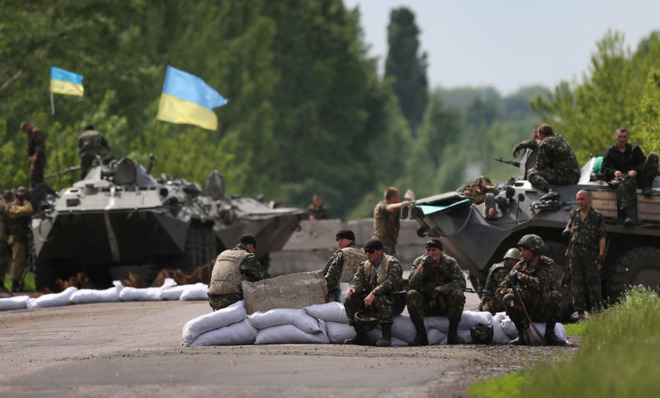Don't save Ukraine
President Obama is doubling down on the U.S.'s commitment to Eastern Europe's security. It's a mistake.


If it were challenged by Russia, how important is Estonia's sovereignty to you? Would you kill and die for it? Send your children to do so? Would you risk the nuclear annihilation of your civilization? Is your gratitude for use of Estonia's airspace during the war on terror that great?
It better be, because this week President Obama reaffirmed our national commitment to just that. In a speech in Tallinn, Estonia, he celebrated the inviolability of the treaty that binds NATO:
"I say to the people of Estonia and the people of the Baltics, today we are bound by our treaty alliance. We have a solemn duty to each other. Article 5 is crystal clear: An attack on one is an attack on all. So if, in such a moment, you ever ask again, 'who will come to help,' you'll know the answer — the NATO alliance, including the Armed Forces of the United States of America, right here, [at] present, now!" (Applause.) "We'll be here for Estonia. We will be here for Latvia. We will be here for Lithuania. You lost your independence once before. With NATO, you will never lose it again." [White House]
Make no mistake about it. Russia's imperial policy in Eastern Europe is dishonest, provocative, immoral, and deadly. And the price of our own freedom does demand that we draw some line that we can point to and say to an aggressor: no further.
The Week
Escape your echo chamber. Get the facts behind the news, plus analysis from multiple perspectives.

Sign up for The Week's Free Newsletters
From our morning news briefing to a weekly Good News Newsletter, get the best of The Week delivered directly to your inbox.
From our morning news briefing to a weekly Good News Newsletter, get the best of The Week delivered directly to your inbox.
But is that line around Estonia? How about Latvia? Is it really worth the U.S.'s full security pledge to say that in the conflict between Ukraine's Europe-facing west and its Russia-adoring eastern rump, that the Europhiles must not only win, but dominate the losers?
As bad and desperate as Russia is, at least its policy is legible. For a decade, Ukraine's internal politics has been a kind of chess match between Russia and the Western Europe. Earlier this year, the European Union and the U.S. took the unrest in Ukraine as an opportunity to help that country's Western-oriented peoples finally put an end to the "progress-impeding" power of Russian speakers in the nation's east. If the West had succeeded in this endeavor, Russia would have been humiliated, and could have lost access to warm water ports. Russia responded by annexing Crimea.
It's well worth reading Keith Gessen's report on how Ukraine's long-simmering political feud has polarized that nation, all while attracting more outside interest. The sentiment he finds among Western-oriented Ukrainians is an exasperation bordering on the genocidal:
All the enemies of progress in one place, all the losers and has-beens: wouldn't it be better just to solve the problem once and for all? Wouldn't it be a better long-term solution just to kill as many as you could and scare the shit out of the rest of them, for ever? This is what I heard from respectable people in Kiev. Not from the nationalists, but from liberals, from professionals and journalists. All the bad people were in one place — why not kill them all? [London Review of Books]
What you see in that extract is a fight America cannot solve or join while retaining its honor and security. If Ukrainians want to maintain control of Donetsk, they must make compromises with its population, or get on with the ugly business of subjugating or murdering them while retaining control of their own border. But the United States should not be a party to it, no matter how satisfying it is for American hawks to defeat a rebel group that symbolically represents Russian power. Indeed, it is precisely the sense that the Ukraine is a cathartic proxy war that fuels the sentiments of Russian nationalism there.
A free daily email with the biggest news stories of the day – and the best features from TheWeek.com
The hawks will say that it will never come to hard questions about whether our sons and daughters will die for Estonia or Donetsk. We can just create deterrents with arms shipments and paper promises forever. But these are the credit-default swaps of national security, a moral hazard that jeopardizes more than our retirement plans.
The sad truth is that smaller states will have a difficult time when they are caught up in major-power politics. Singapore is already looking at Ukraine and telling itself that it cannot rely on security treaties. And of course it shouldn't, because Great Powers freely violate them. In truth, if the United States were facing a land invasion, I wouldn't begrudge a small state like Estonia if it conveniently forgot its NATO obligation to commit national suicide in our defense.
It's time to stop looking at our security promises as moral press releases, and instead count the cost. It's time to stop playing pretend with Eastern Europe's security.
Michael Brendan Dougherty is senior correspondent at TheWeek.com. He is the founder and editor of The Slurve, a newsletter about baseball. His work has appeared in The New York Times Magazine, ESPN Magazine, Slate and The American Conservative.
-
 ‘The menu’s other highlights smack of the surreal’
‘The menu’s other highlights smack of the surreal’Instant Opinion Opinion, comment and editorials of the day
-
 Education: More Americans say college isn’t worth it
Education: More Americans say college isn’t worth itfeature College is costly and job prospects are vanishing
-
 One great cookbook: ‘More Than Cake’
One great cookbook: ‘More Than Cake’the week recommends The power of pastry brought to inspired life
